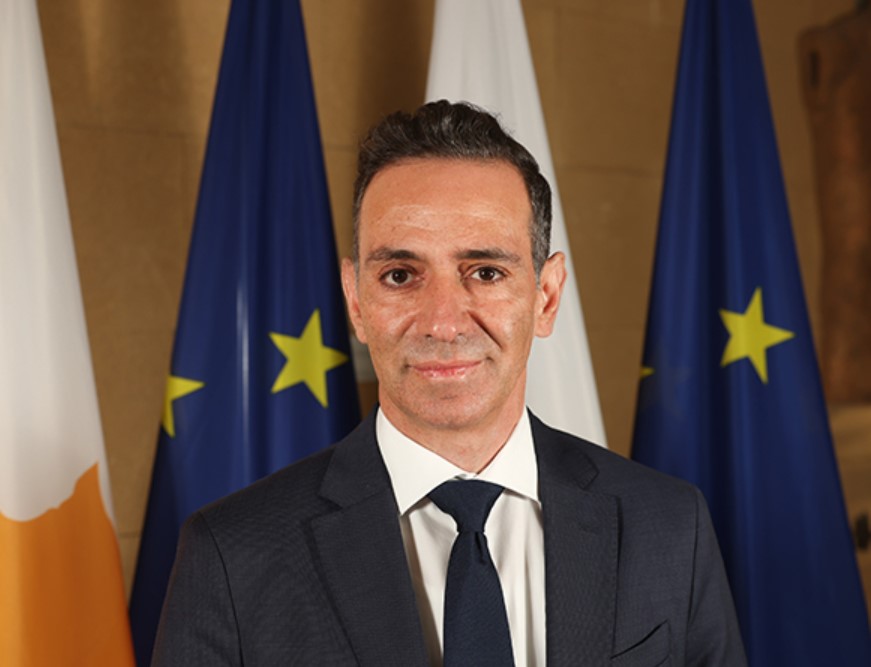Damianou highlights strategic importance of AI and data at CITEA conference

Deputy Minister of Research, Innovation and Digital Policy Nicodemos Damianou on Thursday set a forward-looking tone at the 3rd CITEA Digital Cyprus Conference, focusing on the potential and strategic importance of both Artificial Intelligence (AI) and data in shaping Cyprus’ digital future.
In a virtual address from Athens, Damianou reflected on his participation in a concurrent ministerial discussion in Greece on AI.
“Yesterday, we signed a binding Memorandum of Cooperation with the Greek Minister of Digital Governance Dimitris Papastergiou,” he announced.
This agreement focuses on exchanging expertise in digital transformation and aims to benefit citizens through joint projects, including the development of the Gov.cy Digital Citizen application and enhancements to the Gov.gr wallet.
These initiatives will pave the way for the further integration of digital services between Cyprus and Greece, enhancing accessibility and convenience for citizens.
Damianou’s speech highlighted the transformative power of AI and big data, advocating their integration across various sectors. He echoed Nvidia’s CEO, Jensen Huang, stating, “It’s very clear that AI is going to impact every industry. Every nation must ensure that AI is a part of their national strategy.”
This vision is driving Cyprus to revise its National AI Strategy, shifting towards a more application-oriented approach. He stressed the importance of moving beyond theoretical frameworks to practical implementations that can be integrated into projects and services being developed by the government.
Among the key initiatives mentioned was the Digital AI Assistant, set to debut on the new gov.cy portal within the year. This assistant aims to streamline interactions between the government and citizens, providing a more efficient and user-friendly experience.
Additionally, the ambitious SmartCyprus project is poised to enter its implementation phase very soon, promising to enhance digital services across the country.
Damianou also outlined the essential conditions for effectively implementing this applied strategy.
First, he highlighted the critical importance of data availability and quality. He emphasised that accessing high-quality, accurate digital data is crucial for developing AI applications.
“We must identify institutions that have data available, even if it’s siloed, clean them up, and ensure they are in infrastructures that AI can utilise,” he explained.
The ultimate goal is to standardise, classify, and unify databases, advancing towards the principle of Ask-Once-Store-Once. This involves interconnecting registries and information systems, a complex process that must be carried out in parallel with data cleaning and standardisation efforts.
He also noted the significant potential of open data in fostering an ecosystem of open innovation and cooperation with the private sector, which can drive new developments beneficial to all.
Equally important is understanding the specific needs of the country and its citizens. Moving beyond merely identifying broad sectoral interests, Damianou emphasised the necessity of developing user-friendly solutions with tangible benefits for citizens, state efficiency, economic competitiveness, and national security.
“We must focus on solutions compatible with our technological capabilities and that have a positive, measurable impact,” he said. This approach ensures that AI applications are not only advanced but also practical and beneficial to everyday life.
Effective mechanisms for implementation are also crucial. Damianou discussed the modernisation of tendering procedures for IT projects, in cooperation with the state treasury which is already underway. This modernisation aims to streamline processes and make them more conducive to innovative AI projects.
He also stressed the importance of collaborating with private sector companies to build and validate proof-of-concepts, noting that nurturing expertise in AI is essential.
“Someone will have to train the AI models, and test them, and that someone must also know the subject matter,” he said, emphasising the need for combining technology investment with human resource development. This dual focus on technology and human expertise is vital for successfully implementing AI solutions.
Highlighting the vibrancy of Cyprus’ AI ecosystem, Damianou cited numerous examples where AI is already making significant strides. These include the development of cybersecurity and defence solutions, the creation of a digital twin’s infrastructure, environmental and climate monitoring tools, and the construction of the first zero-emission vessel in Cyprus.
This pioneering project is funded by the Research and Innovation Foundation (RIF), which actively supports various AI applications through its funding programmes. Damianou revealed that more specific national programmes, tools, and incentives are being considered to support private investment in AI solutions, including investment in infrastructure.
However, Damianou cautioned that these advancements must be balanced with robust safeguards to manage risks and build public trust.
“The use of the word ‘harnessing’ in the title of this year’s conference is apt,” he said, alluding to the EU’s AI Act, which aims to regulate AI development and use ethically and responsibly.
This Act seeks to ensure an ethical and trustworthy framework for AI, with stricter controls in sectors where higher risks are identified.
Cyprus is already taking steps towards national harmonisation with these standards, including the designation of a competent authority for compliance checks, which will oversee the ethical deployment of AI technologies.
What is more, Damianou also emphasised the need for a collaborative effort involving all sectors.
“We are planning to establish a national AI Task Force,” Damianou said.
This will serve as a bridge between strategic policy and practical implementation. Under the guidance of the management, it will ensure better governance and help align AI projects with national goals.
In addition, this task force will also seek to connect with international experts, bringing invaluable knowledge and experience from abroad.
Finally, Damianou acknowledged the significant challenges ahead but also the vast potential benefits. He concluded that “the challenge is great, but the opportunity is also important.”
